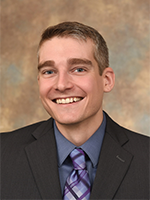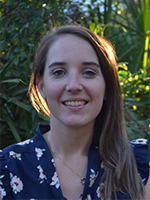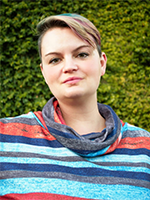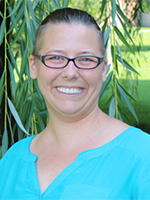This year’s Fellows class comprises ten graduate students and postdocs from across the country with sterling credentials and a demonstrated interest in how legislation and policy affects the pharmacology profession and the larger biomedical sciences community. This March, Fellows will arrive in Washington, D.C. to participate in a one-day mini-conference organized by ASPET, where they will receive training in advocacy and hear from guest speakers in the policy profession. The next morning, Fellows will travel to Captiol Hill to meet with legislators and staff to discuss the challenges facing the scientific community. Washington Fellows also receive paid registration to ASPET’s Annual Meeting at Experimental Biology 2020 in San Diego, CA, where they will have the opportunity to network with ASPET members and with Fellows from previous years.
 Sean Collins – University of Cincinnati
Sean Collins – University of Cincinnati
A native of Waynesville, OH, Sean received his bachelor’s degree in psychology from Wright State University in Dayton, OH. He went on to subsequently earn his PhD from the department of psychology at the University of Illinois at Urbana-Champaign where he developed a research interest in the exploration of the cellular mechanisms underlying neurological disease. He is currently conducting his postdoctoral work within the Robson laboratory at the University of Cincinnati where he investigates the molecular mechanisms responsible for the generation of neuropsychiatric disorders following traumatic brain injury. Sean believes that the possession of effective advocacy skills is crucial for the next generation of biomedical researchers and that future, sustained federal investments into biomedical research will aid in alleviating the significant health and economic burdens of the American populace. As a Washington Fellow, Sean hopes to gain experience in communicating with state and national lawmakers about the economic and societal value in supporting basic science research.
 Bayli Dean – University of Florida
Bayli Dean – University of Florida
Bayli is a native of Florida and earned her bachelor’s degree in biology from the University of Florida. She found a passion for cancer research and advocacy after her mom was diagnosed with metastatic colon cancer. Bayli became involved in research as a sophomore and is currently pursuing a PhD in biomedical sciences in the Department of Neurosurgery at the University of Florida. Under the mentorship of Dr. Catherine Flores, she is elucidating the role gliomas have on hematopoietic stem and progenitor cells and their progeny. Outside of the lab, she is involved in patient education initiatives such as the creation of informational handouts on oncofertility as well as a guide to pediatric brain tumors. As an ASPET Washington Fellow, Bayli hopes to combine her experience as a caregiver with the knowledge she’s gained during her PhD to effectively advocate for solutions to overcome disparities in the cancer patient population.
 Angela Dorigatti – University of Texas Health at San Antonio
Angela Dorigatti – University of Texas Health at San Antonio
Angela is an energetic and forward-thinking biomedical scientist originally from Wisconsin. She completed her bachelor’s degree in biology at Texas Tech University in sunny Lubbock, Texas, where she volunteered for healthcare-related organizations, participated in academic research, and was the Vice-President of Tech Young Progressives, a student-led organization aimed at advancing progressive policies.
Angela’s strong interest in longevity and aging studies drew her to one of the top biology of aging programs in the nation. At the University of Texas Health at San Antonio, she is pursuing a PhD in biomedical sciences in the biology of aging discipline under the mentorship of Dr. Veronica Galvan at the Barshop Institute for Longevity and Aging Studies. Her award-winning research is focused on cellular senescence and neurodegeneration in Alzheimer’s disease (AD) which currently has no cure nor viable treatments to alter the progression of the disease. Her studies have revealed a potential novel mechanism driving neuroinflammation and neuronal dysfunction in AD, linking pathogenic tau to astrocyte senescence and neurodegeneration. This research may lead to potential therapeutic interventions using senolytics (which selectively remove senescent cells) to slow the progression of AD. Under the ASPET Washington Fellows program, Angela hopes to be an effective advocate for healthcare access and scientific research funding.
 Lindsey Galbo – Wake Forest School of Medicine
Lindsey Galbo – Wake Forest School of Medicine
Lindsey is from northwest Pennsylvania and received her bachelor’s degree in biology from Allegheny College. Following graduation, Lindsey worked for four years at Charles River Laboratories as a research biologist and later as a project leader in the toxicology department. She left Charles River to continue her education in a psychological science master’s program at Northern Michigan University under the mentorship of Dr. Adam Prus. Here, Lindsey began to develop her deep passion for understanding the behavioral pharmacology of abused drugs. She completed her master’s thesis studying the effects of MAO inhibitors on the rewarding properties of nicotine and graduated in May of 2018. In August of 2018 she enrolled at Wake Forest University Graduate School to pursue her PhD in physiology and pharmacology. She is training under the mentorship of Dr. Paul Czoty and is utilizing a nonhuman primate model of alcohol use disorder to investigate alcohol’s effects on cognition, and how cognitive-enhancing drugs may be used as potential pharmacotherapies. Since she came to Wake Forest, Lindsey has been appointed as a T32 fellow by the Wake Forest Translational Alcohol Research Center and has founded the Wake Forest School of Medicine chapter of Students for Sensible Drug Policy – an international organization devoted to lobbying against counter-productive drug policies. As an ASPET fellow, Lindsey hopes to learn how to communicate her extensive experience in laboratory animal science, as well as her knowledge of the behavioral pharmacology of abused drugs, in order to advocate for practical drug policy reform.
 Shannon Kozlovich – University of California, San Francisco
Shannon Kozlovich – University of California, San Francisco
Shannon developed an interest in the intersection of science and policy as a tobacco research scientist; tobacco research often translates to regulation and public health policy instead of clinical outcomes. She is now a postdoctoral fellow at the University of California San Francisco in the Center for Tobacco Control Research and Education where she is studying the impact of nicotine on cancer therapeutics and the differences in nicotine pharmacokinetics between JUUL and conventional cigarettes. Shannon was raised to be an activist by a family of activists and she is looking forward to building a career where she can combine her life experiences and scientific training to decrease the tobacco use rates in the United States. Shannon was born and raised in San Bernardino County California, then went on to raise her own child in Spokane County Washington. She began college for the first time as the single parent of a third grader intent on becoming a nurse. It was during her pre-nursing courses at Spokane Community College where she discovered her fascination with biological chemistry. After receiving her associate’s degree she went on to receive her bachelor’s degree in chemistry from Whitworth University and her PhD in pharmaceutical sciences from Washington State University, where she served as the student government director of legislative affairs. As an ASPET fellow, Shannon hopes to learn how to develop talking points and written statements to effectively advocate for the importance of the use of scientific evidence in the development of public health policy and product regulation.
 Jerry Madukwe – Yale University
Jerry Madukwe – Yale University
Jerry is a biochemistry graduate of Lee University in Cleveland, Tennessee, where he finished with honors. He holds a master’s and PhD degree in biochemistry from the University of Rochester, New York. During his graduate studies in biochemistry, examining the mechanism of activation of proteins—implicated in cancer and cardiovascular disease—downstream of G protein-coupled receptors, and characterizing a novel pharmacological compound for ischemic heart disease, he won multiple awards and honors. Also, Dr. Madukwe was selected to participate in the Sao Paulo School of Advanced Science in Cell Biology Workshop at the University of Sao Paulo in Brazil. Currently, he is a postdoctoral associate at the Cancer Biology Institute, Yale University. Dr. Madukwe’s postdoctoral work applies advanced biochemical and biophysical approaches to study the interactions of critical receptor tyrosine kinase proteins implicated in the development of cancer and cardiovascular disease, with a view to develop novel pharmacologic therapies to augment current treatment strategies. In addition, Dr. Madukwe has been involved in science outreach programs in his local community here in the United States and in West Africa, to attract young students to a career in the sciences. As an ASPET Washington Fellow, Dr. Madukwe wants to use his training to advocate for increased diversity in science. He is also interested in advocating for policies that build the science research capacity of underserved communities and promote the application of science for economic development in disadvantaged communities.
 Anastasia Robinson – Howard University
Anastasia Robinson – Howard University
Anastasia was born and raised on the twin island Republic of Trinidad and Tobago. She received her Bachelor of Science degree in biology from Howard University. During her undergraduate tenure, she was introduced briefly to drug discovery and development. During this time, she also began to ponder on how drugs worked in the body and how they interacted with each other. After doing some research on her own she understood that she was interested in pharmacokinetics and pharmacodynamics in the field of pharmacology. After receiving her degree, Anastasia returned to Trinidad and Tobago where she worked in a public hospital as a laboratory assistant primarily in the microbiology lab. Her aspiration not forgotten, she returned to Howard University where she is currently pursuing a PhD in pharmacology under the mentorship of Robert L. Copeland, PhD. Her research is focused on the development of a novel treatment of triple negative breast cancer utilizing a 1,4 chloronaphthoquinone analog as well as Fagara xanthoxyloides and Pseudocedrela kotschyi, crude extracts of plants which are native to West Africa. She hopes to enhance the skills taught to her during this fellowship to become an advocate for increased biomedical funding and to encourage future scientists on the importance of advocating for themselves at the state level.
 Aratrika Saha – LSU Health Sciences Center
Aratrika Saha – LSU Health Sciences Center
Born and raised in the city of Kolkata in India, Aratrika graduated in July 2017 from Manipal Institute of Technology, Manipal University, India with her Bachelor of Technology degree in engineering, majoring in biotechnology. She then moved to New Orleans in August 2017 to pursue a PhD at the Louisiana State University Health Sciences Center in the department of pharmacology and experimental therapeutics. She is currently in her third year and has been working under the guidance of Dr. Wayne L. Backes. Her research focuses on cytochrome P450s and their interactions. Cytochrome P450s are heme containing enzymes that interact with limited levels of NADPH-cytochrome P450 reductase (POR) to oxidize endogenous and exogenous compounds and convert them into water soluble products. However, they are also capable of forming homomeric and heteromeric complexes that alter the metabolic activity of the P450s involved in these complexes. Aratrika is on the path to identifying the regions of these proteins that are responsible for these complex formations and characterize new complex formations. Additionally, she has been involved with the International Students Association from 2017. She was a founding member and has served as the vice president of the founding committee and then went on to serve as the president in the following year. As an ASPET Washington Fellow, Aratrika hopes to gain a better understanding of the world of policymaking at the state and federal level and to advocate for interdisciplinary and collaborative research between the world of academia and industry.
 Christopher Szlenk – Washington State University
Christopher Szlenk – Washington State University
Chris was born and raised in Birmingham, Alabama by Polish immigrants. He received his Bachelor of Science in chemistry from the University of Alabama at Birmingham (UAB). During his time at UAB, Chris became interested in policy from his sociology class. He decided to write a report on the United States prison system and the unusual number of minorities in jail for non-violent crimes. This opened his eyes to how evidence-based policy could address fixing issues at the federal level. At the same time, he fell in love with organic chemistry and joined a synthesis lab to supplement his fascination with the subject. After he finished his undergraduate degree, he worked for a short time in a skin pathology lab. He quickly realized he needed more mental stimulation and applied to the pharmaceutical sciences PhD program at Washington State University in Spokane. Under the mentorship of Dr. Senthil Natesan, his research is focused on utilizing the membrane in a specific manner to design novel medication. Chris’ main project focuses on molecular dynamics simulations of commonly used asthma medication, and also includes designing a biased, allosteric modulator for the mu-opioid receptor to limit side effects. During graduate school, Chris became interested in advocacy, drug policy, and getting involved with the community in Spokane. He joined committees on campus to improve life for students, finished training to become a Dancesafe volunteer, and joined the Health Sciences Student Advocacy Association. As an ASPET fellow, he hopes to learn how to effectively promote evidence-based policy to legislators and expand his understanding of how the entire political process works. Additionally, he wants to begin addressing distrust of science by communicating effectively and listening to what more scientists can do to improve the public’s trust.
 Melissa Wilkinson – Rutgers Environmental and Occupational Health Sciences Institute
Melissa Wilkinson – Rutgers Environmental and Occupational Health Sciences Institute
Born and raised in Argyle, New York, Melissa graduated from Nazareth College of Rochester with honors with her Bachelor of Science degree in biology and toxicology in 2017. While at Nazareth she cultivated her love for science through numerous research opportunities. She also engaged in her campus community as a varsity swimmer and student senator in the Undergraduate Association. Following her undergraduate education, Melissa moved to New Brunswick, New Jersey, to pursue her PhD in toxicology at Rutgers University in the joint graduate program in toxicology. Under the mentorship of Dr. Andrew Gow, her research is focused on the use of nitrated fatty acids as an anti-inflammatory agent in acute lung injury and interstitial lung diseases. Melissa continues to stay involved in her campus community through her role as vice president of the Rutgers Association of Toxicology Students and as coordinator of the Toxicology, Health, and Environmental Disease High School Summer Program. As an ASPET Washington Fellow, Melissa hopes to advocate for the importance of STEM education, especially in rural communities like her own, and hopes to utilize her own experiences to demonstrate the importance of funding for biomedical research and education programs.